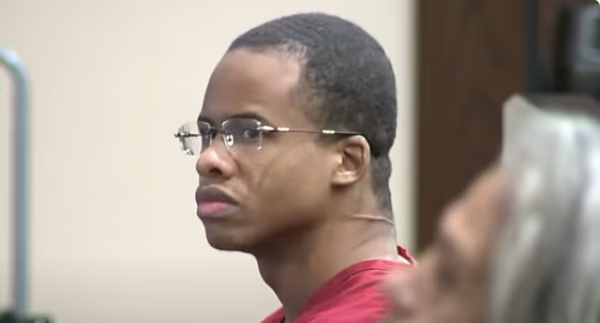Tay-K’s Ex-Girlfriend Identifies Him as Shooter in Ongoing Murder Trial
The trial surrounding the 2017 murder of Mark Saldivar has captured national attention, particularly due to the involvement of controversial rapper Tay-K, whose real name is Taymor McIntyre. In dramatic developments, Joanna Reyes, Tay-K’s former girlfriend, testified in court that Tay-K was the shooter in the incident. Reyes, who herself is embroiled in accusations related to the murder, has switched sides by becoming a government witness after accepting a plea deal.
Testimony Unfolds with Prior Accusations Against Reyes
During her testimony, Reyes recounted a series of events that led to the fateful encounter on the day of Saldivar’s murder. She explained that she had arranged for a photoshoot involving Saldivar, Tay-K, and two other associates, Jalen Bell and Jeremiah Rodriguez. According to Reyes, the situation escalated when Tay-K allegedly pulled a gun on Saldivar, demanding he relinquish his backpack. When Saldivar resisted, Reyes claimed that Tay-K and the others began physically assaulting him.
In a pivotal moment, Reyes stated that Saldivar tried to escape by climbing onto the hood of her vehicle. She testified that Tay-K threatened her with the gun and commanded her to pull Saldivar down. Failing to comply, Reyes described how Tay-K leaned out of the car and shot Saldivar, a chilling detail that has intensified the severity of the case.
Despite the gravity of the situation, Reyes admitted that she did not report the incident immediately. She cited fear for her safety and expressed concerns over threats directed at her and her family by Tay-K.
Tay-K’s Legal Troubles Continue to Mount
Tay-K’s history paints a troubling portrait. The rapper first gained recognition with his viral 2017 hit single "The Race." However, he was previously convicted of murder stemming from a 2016 home invasion, receiving a 30-year sentence for aggravated robbery along with two additional 13-year sentences for other robbery-related offenses, all of which are being served concurrently.
Crucially, the murder of Saldivar took place while Tay-K was evading law enforcement. He had cut off his ankle monitor, thereby violating his house arrest. With his legal situation growing ever more grave, Tay-K publicly expressed his desire for a second chance earlier this year. In a candid post on social media, he reflected on his lengthy incarceration, stating, “I really just need 1 chance @ adulthood.” He aired grievances about perceived inequalities in the justice system, particularly noting that if he were a "lil white kid," he might not have received such a harsh sentence for an alleged role he described as "insignificant."
Disparity in Sentencing Highlighted
Tay-K further underscored what he sees as a racial disparity in sentencing by contrasting his case with that of a white female co-defendant who was also 16 at the time of her involvement. He mentioned that she was not certified as an adult and consequently received only ten years of probation, whereas he, along with another co-defendant, was treated as an adult. His statements point to broader discussions around how race influences legal outcomes.
Continued Trial Raises Questions and Concern
As the trial progresses, Reyes’s testimonies have introduced intricate layers to Tay-K’s already complicated legal narrative. The allegations against him and the intricate dynamics with his co-defendants raise pressing questions about justice, accountability, and the impact of societal perceptions on the legal process.
The ongoing proceedings not only emphasize the personal ramifications of these legal battles but also spotlight broader issues of systemic inequities in the justice system. The case has become a focal point for discussions about youth, crime, and the evolving conversation around rehabilitation versus punishment in the American legal framework.
As the trial unfolds, it remains to be seen how this critical testimony will affect Tay-K’s future and what implications it might have for how similar cases are viewed and adjudicated in the future.









